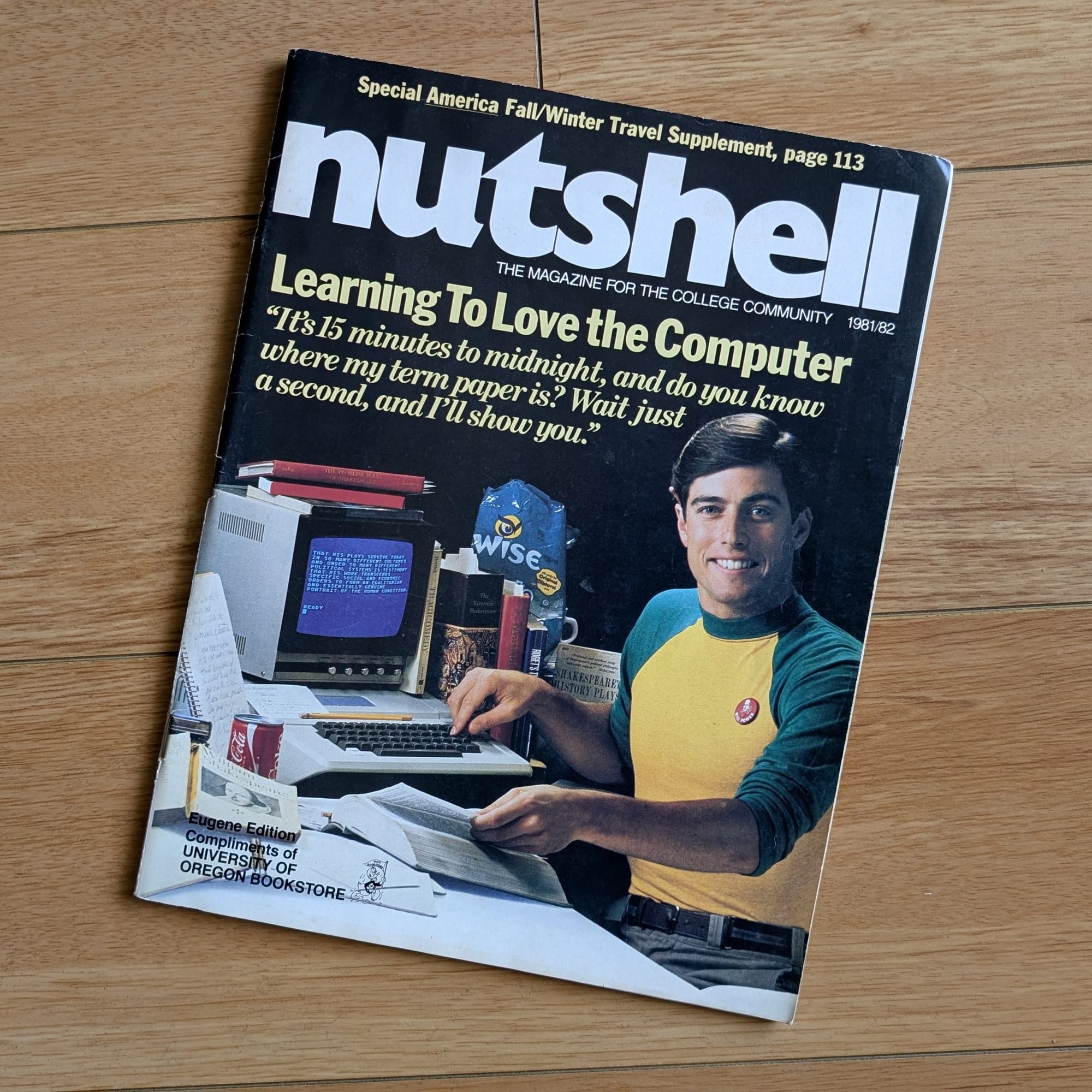A couple months ago, while I was thumbing through old magazines at a record shop, I landed on a gem. “Learning To Love the Computer” emblazoned the cover of Nutshell magazine, a now-defunct periodical for college students. This 1981 issue showed a desk littered with books about Shakespeare, some chips, a Coke can, a boxy PC displaying the start of a homework assignment, and a college student grinning widely. I grinned back. Then I bought the issue.
“You’d better hurry up and learn to love them, because they’re rapidly reshaping our world,” the story said of PCs. Computers changed how we worked and socialized as they swallowed steadily larger bites of tasks previously reserved for typewriters, pens, and minds. That momentum has not stopped. And as generative AI gobbles up internet functions from research to retail, our professional and personal lives also invariably shift.
To make sense of how GenAI can change our lives and our minds, the real questions are, what even is critical thinking? And what does it mean for our intellectual skills to deteriorate?
That’s not news. It’s hardly even surprising. Jeff Shear, the Nutshell writer, speculated as much about the rise of computers. “Exactly how computers will alter our lives is difficult to predict. One possibility some theorists have suggested is increased personal isolation. By the end of this decade the big question facing many Americans may be ‘Why bother going to work?’” he wrote.
Earlier this year, researchers from Microsoft and Carnegie Mellon University surveyed 319 knowledge workers about how using generative AI affects their critical thinking. They observed that GenAI can weaken people’s problem-solving skills. Then, in June, researchers from MIT Media Lab released evidence that study participants who rely on ChatGPT to write essay drafts get “lazier” over time compared to those who search the web or use just their minds. The technology we use to carry out tasks influences our brain’s connectivity. The MIT study, which has not yet been peer-reviewed, shows that ChatGPT users had the weakest engagement of “beta brain waves” associated with thinking and focus.
There are many ways to interpret this data. A techno-optimist might tell you that cars have weakened our horseback riding skills. A techno-pessimist might tell you this planet-warming, error-prone tech makes life so much “easier” that our minds can no longer keep up.
To make sense of how GenAI can change our lives and our minds, the real questions are, what even is critical thinking? And what does it mean for our intellectual skills to deteriorate?

I called Daniel Willingham, a psychologist at the University of Virginia and expert in theories of learning. “Experimental psychologists don't use the term critical thinking,” he told me. “It’s kind of a basket term.” To educators, it means two things: thinking well when you’re supposed to think (like analyzing a poem), or thinking when other people might not bother to think (“Like if I order a cup of hot water and add a shot of espresso at Starbucks. That's really an Americano, but it ends up being cheaper,” he said.) To psychologists, this type of cognition breaks out into other intertwined dimensions, like knowing, understanding, decision-making, and problem solving.
Making decisions, like which car you should buy, taps into your ability to recognize and analyze personal goals. Solving problems taps into your ability to weave multiple steps together. People think these skills don’t depend on knowledge per se, but that’s wrong, Willingham told me. From a young age, we accumulate knowledge by solving problems and making decisions ourselves. If using generative AI to offload problems and decisions means you remember less about that domain, “then that could be a problem,” he told me, especially for kids using chatbots since they have a smaller base of knowledge. “And I think that’s quite plausible.”
Critical thinking is about engaging with knowledge. “It’s going one step beyond what the actual information is telling you,” said Alfredo Spagna, a cognitive neuroscientist at Columbia University who studies imagination and mental imagery. Making inferences requires imagination that we accrue over a lifetime of experiences. You have to imagine yourself outside of the present moment.
Imagination is a skill. I knew what morsels of information I wanted to convey before I wrote any of these words. To actually write, however, I had to imagine how each idea interconnects and how to arrange the beats in the way that I imagine you will find most direct and entertaining. And like any skill, this imagination can weaken without practice.

“What’s now being automated is problem solving and creativity,” said Marvin Kopka, an expert in responsible AI at the Berlin Institute of Technology who studies human-technology interaction. Kopka told me he’ll sometimes use AI as a thesaurus. “I do become slightly worse at thinking of the words myself.”
This suggests that people have an internal sense of friction when they’re thinking. It’s up to the individual to sense when using GenAI becomes a reflex, or when it becomes harder to think of the right word, or whether any of that even matters. Kopka has seen students in his college courses rely on ChatGPT, but then rebound away from the app when it goes too far. “At some point they get incorrect advice or incorrect information and they start to think on their own again,” he said.
People think these skills don’t depend on knowledge per se, but that’s wrong
This sense of doubt is critical thinking. When that skill atrophies, GenAI can sneak across an unseen boundary from safe to pathological. You should always doubt what a generative AI algorithm tells you. At a minimum, that doubt will save you when you catch a hallucinated fact. Better yet, that doubt can lead you to source material that delivers more answers and more confidence.
Relying on GenAI isn’t inherently bad for your mind. Kopka told me that his students have gotten better at using AI more critically over time. Of course, as he noted, these are university students taking a class about decision-making. They’re primed to scrutinize human-tech interaction.
What about the rest of us? Spagna is not particularly worried about AI users at large losing their ability to think critically altogether. If some skill is malleable enough to weaken by relying on technology, then it’s probably also malleable enough to reinforce by changing up daily habits, he said. “The question is about how you use [AI],” Spagna said.
In that sense, it’s not AI that will weaken every user’s critical thinking skills — but it might create a divide between people depending on whether it increases how much they engage with information, or reduces it. You can use AI as a springboard for ideas that spark creativity, or as a one-click replacement for creativity. Future AI agents may free up your working time to do more rewarding things, or it can embolden employers to demand that we “produce” more.
“What’s now being automated is problem solving and creativity"
Social media gives us an interesting precedent for technology's polarized effects. Facebook originally claimed to “make the world more open and connected.” Yet despite all the faults of social media companies, their products still have significant value as tools to facilitate human connection, whether to passively keep up with old friends and local businesses, or find marginalized communities in niche online spaces.
What dulls that silver lining is that social platforms profit from attention, not connection. So the only remedy to social media’s disinformation, polarization, bullying, body image issues, and sleep risks is to self-regulate: setting up a screen timer, deleting Instagram for a month, or just leaving the platforms altogether. Just as social media should enhance, not replace, social interaction, so should generative AI enhance, not replace, critical thinking.

We can look to both imagination and doubt as compasses in navigating generative AI, the way you might ask yourself if you’ve had real quality human interaction to stay safe from social media addiction. Have you felt the friction of decision and creativity today? Do you still fact check the responses a chatbot gives you? “Anytime you're doing something that's really good for your mind, it's probably a little bit unpleasant,” Willingham said. Choose wisely which tasks you should keep for yourself. “A simple rule of thumb is, is this something that you really want to be good at?”
In that 1981 Nutshell cover story, the author Shear wonders about how AI might one day challenge our sense of humanity: “If a machine can think, then what makes the human being unique?” But in a moment when the government arrests science and sycophantic billionaires control the internet, our existential questions don’t need to be so abstract. Critical thinking is self-defense.
“It sounds kind of ironic,” Kopka said, “but I think textbooks written by experts will probably be of more value in the future than using Google.” That is, of course, if we know for certain that the expert wrote that textbook themselves.






